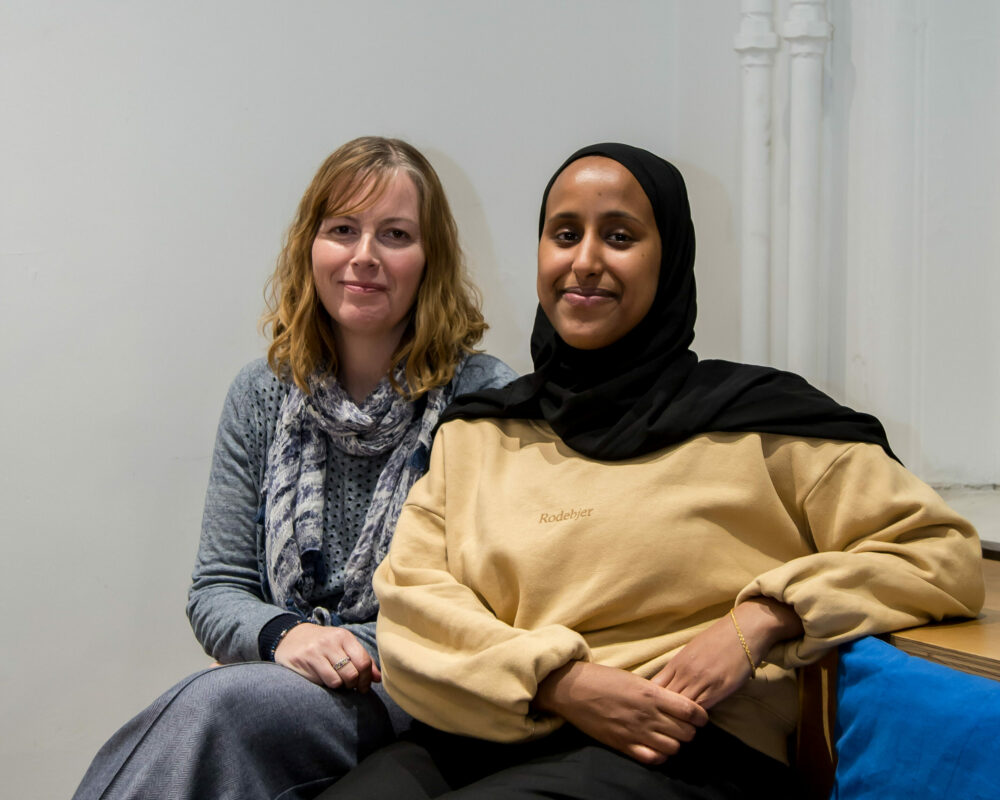Arts Emergency mentors support young people in Greater Manchester, London and Merseyside who are interested in the creative and cultural industries and are taking their first steps out of compulsory education.
Registration for the next mentoring cohort will open in August 2026. Join our Network to be the first to hear when registration opens.
Should I be a mentor?
Our volunteers are reliable, passionate and warm. Most have studied an arts or humanities subject at university or have worked in the creative and cultural industries. We match mentor pairs based on their shared interests, experiences and geographical location.
- Who's it for? People who are happy to be paired with a 16-18 year old for a 12-month period, meeting once a month from January each year (usually in-person) in Greater Manchester, London or Merseyside. Occasionally we will pair young people with mentors remotely.
- What do they do? Mentors provide information, advice and guidance, share their skills, experience and knowledge to support young people in understanding their first steps out of compulsory education. They provide insight in a creative, academic, or cultural field. Mentoring pairs meet once a month for about an hour. Mentoring can be flexible around your commitments. During busy periods e.g. exams, you may not meet every month but mentor pairs tend to make up for it the following month.
- Considerations: 16-18 year olds have a lot going on! You may need patience to work to get your mentee to come out of their shell and develop the confidence and language to talk to you not as a teacher, or a family member, but as a professional friend.
- Number of mentors needed: This is our flagship programme and we need as many mentors as we can! We're aiming to get at least 450 volunteer applications with a view to match 300 pairs in 2026 and while not everyone who signs up will be matched every year, everyone will be trained and offered additional development opportunities.

Mentor traits
Our mentors are all unique, but they do share some similar traits. Our volunteers are committed to being:
- proactive communicators
- able to relate well to people
- good at problem solving or talking through issues
- reliable and dedicated
- able to provide insight from their personal experiences
We’re especially keen to engage mentors who may have shared experiences with our mentees, such as people from an ethnic minority background, LGBTQIA+ people, disabled people, and those who have identified as working class.
We ask our volunteers to uphold values of being bold, optimistic and community-focussed. Before matching, we ask all volunteers to agree to a Code of Conduct and provide referees which we can contact for a character reference.
Career Areas
Below is a list of the areas mentors might have experience in:
Art & Design
- Architecture & Interior Design
- Crafts
- Fashion Design
- Graphic Design
- Industrial Design
- Photography
- Visual Arts
Performance
- Comedy
- Dance
- Film & TV (on-screen)
- Music
- Theatre (on-stage)
Media & Screen
- Animation
- Broadcast Journalism
- Film & TV (off-screen)
- Gaming
- Radio & Podcasting
- Theatre (off-stage)
Writing & the Humanities
- Academia & Research
- Creative Writing
- Politics & Activism
- Print Journalism
Creative Roles & the Cultural Sector
- Advertising & Marketing
- Arts Administration
- Cultural Education & Engagement
- Galleries
- Heritage
- Libraries & Archives
- Publishing
If your area of expertise is not on this list, that doesn't mean you can't volunteer - we are always very happy to expand!
Matching
We hand-match mentoring pairs based on your combined interests, experience, location and needs, using the information you provide in the registration form below. We train more mentors than we have young people because it allows us to make the best possible match for every young person. This does mean that we are unable to match everyone who signs up. However, even if you are not matched initially we will contact you if we do have a suitable match further down the line or when we next recruit young people.
Matching takes place throughout November with mentoring starting in January.
Training
All first-time mentors need to attend a mentor training event. Our training events give essential insights into how our mentoring programme works and all the tools you need to provide amazing support to your mentee. You’ll learn transferable skills about mentoring, coaching, safeguarding and some guidance on structuring sessions, accountability and goal setting. We’ll also answer any questions you might have about supporting a young person.
Refresher training
If you have mentored with us before you can always join another training session if you want a recap.
I’ve gained confidence in my knowledge and my experience. Looking back at my journey from school to now makes me realise how far I’ve come. You never stop suffering from imposter syndrome so it’s been a good reminder to myself that I do know stuff and have insights to share.
Claire, 2024 mentor